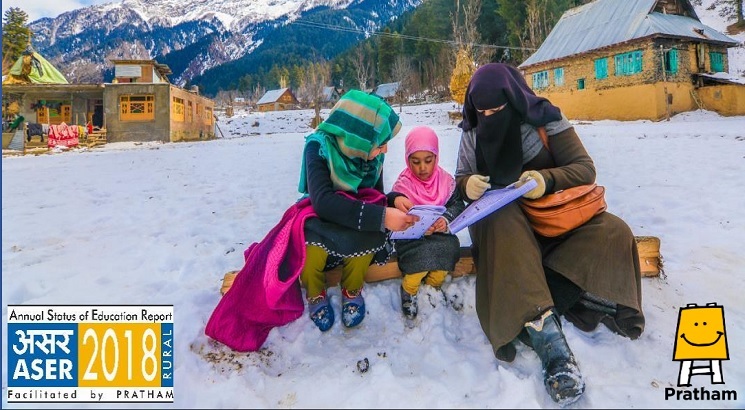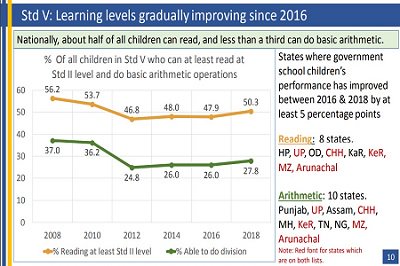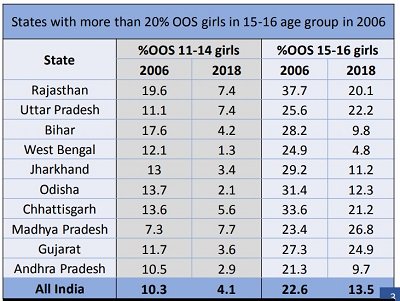Private school enrolment stagnates at 30% since 2014, Gender gap narrows: ASER 2018
Abhay Anand | January 16, 2019 | 07:24 PM IST | 3 mins read

NEW DELHI, JANUARY 16: The year on year increase in private school enrolment seems to have stopped around 30 percent since 2014, reflecting a positive change in the improvement of the quality of education in government schools. From 2006 to 2014, private school enrolment increased steadily from 18.7% to 30.8%, suggests the recent Annual Status of Education Report (ASER) 2018.
The report states that since 2014, the private school enrolment has remained at about 30.6% in 2016 and 30.9% in 2018. There has been a decline in private school enrolment of more than 2 percentage points over 2016 levels in Rajasthan, Uttar Pradesh, and Kerala.
An increase of more than 2 percentage points over 2016 is visible in Jammu and Kashmir, Himachal Pradesh, Bihar, and Gujarat. Most states in the north-east, other than Mizoram, see an increase in private school enrollment between 2016 and 2018.

The positive trend with respect to government schools started emerging from 2016 onwards, as in ASER 2016, for the first time since 2010, there was an improvement in government school learning levels, even though it was only observed in class III. This year, the situation has further improved with an improvement in government schools in class III as well as in class V.
The Report states that in class III the percentage of children who are at grade level (those who can read a class II level text) fell from 17.4% in 2009 to 15.9% in 2013. “This proportion subsequently increased to 17.2% in 2014, 19.3% in 2016 and now stands at 20.9% in 2018. In Std V, on the other hand, the percentage of children who could read an Std II level text fell steadily from 50.7% in 2010 to 41.7% in 2016. But finally, this figure shows an improvement in 2018 at 44.2%, Report states.
Enrolment vs Attendance
For over ten years, since 2007, the enrolment of children for the age group 6 to 14 has been above 95%. The proportion of children (6-14 years) who are not enrolled in school has fallen below 3% for the first time and stands at 2.8% in 2018.
Though the overall enrolment has been above 95% since 2010 attendance varies from state to state with some states registering more than 85% while some having attendance as low as 60%.
Attendance based on visit on a random day States: ASER 2018
| 85% & more | Gujarat, Maharashtra, Karnataka, Tamil Nadu |
| 80% to 84% | Himachal, Punjab, Uttarakhand, Kerala, Mizoram, Odisha, Andhra, Sikkim |
| 75% to 79% | J&K, Haryana, Rajasthan, Chhattisgarh, Telangana, Arunachal, Nagaland |
| 70% to 74% | All India, Assam, Meghalaya |
| 60% to 69% | Jharkhand, Tripura |
| Below 60% | Uttar Pradesh, Bihar, West Bengal, Madhya Pradesh, Manipur |
There has also been a significant improvement in girls enrolment. In 2006, the all India proportion of girls in the age group 11 to 14 who were out of school stood at 10.3%. In that year, 9 major states had out of school figures for girls (11-14) above 10%. In 2018, the overall proportion of girls in the 11 to 14 age group out of school has fallen to 4.1%. This figure is more than 5% in only four states. “Further, ten years ago in 2008, nationally, more than 20% of girls in the 15 to 16 age group were not enrolled in school. In 2018, this figure has decreased to 13.5%,” states ASER 2018.
 ASER 2018 reached to 596 districts in rural India taking opinion of 354,944 households and 546,527 children in the age group 3 to 16.
ASER 2018 reached to 596 districts in rural India taking opinion of 354,944 households and 546,527 children in the age group 3 to 16.
No overall increase in private school enrollment since 2014
| % Private | 2006 | 2008 | 2010 | 2012 | 2014 | 2016 | 2018 |
| All India | 18.7 | 22.6 | 23.7 | 28.3 | 30.8 | 30.6 | 30.9 |
Follow us for the latest education news on colleges and universities, admission, courses, exams, research, education policies, study abroad and more..
To get in touch, write to us at news@careers360.com.